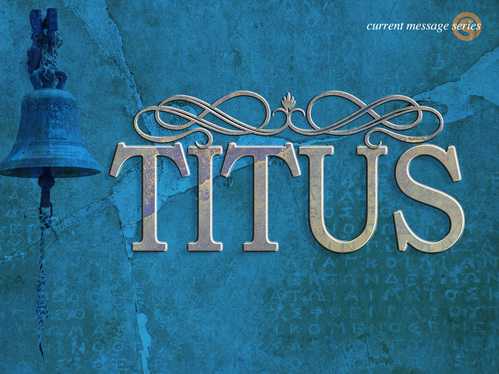|
Titus, Part 1
Does everything rise and fall on leadership? The Apostle Paul seemed to think so. He was on one of his missionary journeys and stopped at a little island in the Mediterranean called Crete. Paul did what Paul did, and he roamed the island sharing the gospel. Those people, largely considered lazy bums by the rest of the world, and even by some of their own commentators, were seemingly ready for some good news, and pockets of folk all over the island became Jesus followers. Paul poured into them as quickly as he could to get the churches established, but as he readied to move on, he knew the job wasn’t finished. Instead, he left behind the namesake of this short little book in the New Testament—Titus—to make sure what was left undone got done. Titus was a smart choice. We don’t know a lot about him, but we do know that Titus wasn’t Jewish. As a Gentile, he would have had a lot in common with the Cretans. We also know that Titus, while fairly young, was a mature Christian, and trusted by Paul. So, Paul gives Titus instructions and, just in case he forgot anything, follows them up with this letter we now have as part of the New Testament. And in these three short chapters, we have a treasure trove of insight on how churches are to be led, how the body is to work together, and what dangers to guard against. Paul makes clear from the first few verses in chapter 1 that his overarching goal is to ensure these new Jesus followers know the truth about what God says and believe it. Paul gets it that people who believe what God says will end up living godly lives. So, good teaching and preaching is needed, but that alone is not sufficient. The preaching and teaching has to be accomplished by people who are living God’s truth out in such a way that they exude God’s characteristics and behaviors. Paul tells Titus to go through the whole island and identify Christians who can be elders in each of the little churches. It’s important to note that there are to be elders—plural—in each location. No cult of personality here. At The Surge, we have four elders right now, and we’d like more. I’m the lead pastor, and I’m on the elder team, but I don’t lead that team. I do not run the show. Those of us on the pastoral team are under the umbrella of the elder team. Second, elders are not elected; they are selected. No popularity contest here. Democracy is a pretty good system, especially given the options. As a poly sci major, I always thought a benevolent dictator would be a good deal, and, of course, I’d be happy to volunteer to be that guy. But the problem is that benevolent dictators die from time to time, and there’s no guarantee the next person will be so benevolent. So, democracy—pretty good, but it’s not perfect. We’ve all experienced candidates winning an election we didn’t think were deserving. Paul then lays out for Titus the qualifications to look for in elders. They have to be above reproach, or, as some translations render it, be blameless. People in the church, people in society, have to view this elder candidate as a person of great character. He shouldn’t be the guy you went to a party with who ended up in a dumpster dressed as Zorro and didn’t know how he got there, ok? An elder should be the husband of one wife. We talked about all the different interpretations of this, concluding this means that an elder candidate should be a “one woman man.” If he’s married, he should be totally devoted to his wife. If he’s single, he’s totally devoted to waiting for that one woman. He’s saving himself for her, which means he’s following Jesus’ directions on sex being reserved for a husband and wife. An elder is supposed to have kids at home who are believers, but that’s not talking about them having to be perfect. They can be strong willed; they can be a handful. Ultimately, the issue is really whether the kids are in need of extra attention that would be denied them if the candidate takes on a leadership role. We need to give those kids every opportunity to succeed. Paul then lists things an elder cannot be: arrogant, quick-tempered, drunk, violent, or greedy for gain. Who wants to serve under someone like that, eh? Instead, he should be hospitable—someone who makes people feel welcome, isn’t part of a clique no one can break into. And he should want the best for other people, be self-controlled, and serious about his relationship with God. Now, up to this point, Paul has not given Titus anything other than character traits to look for. But that changes in Titus 1:9 - He must hold to the trustworthy word as taught, so that he may be able to give instruction in sound doctrine and also to rebuke those who contradict it. This really is the job description for elders. They have to know God’s word, be able to teach it to others, and correct those who are improperly interpreting it. You can see why it’s so important for an elder to have great character. If he’s a jerk or is involved in questionable activities, he’s not going to have credibility with other people he’s trying to teach or correct. Now, this does not mean an elder has to be a tremendous public speaker. Teaching could be one-on-one, in small classes, in premarital counseling, etc. He just has to be able to get someone from point A to point B using the word of God. And the word of God has to be authoritative for an elder. This trustworthy word as taught is used to interpret everything else, including such things as the Koran, the book of Mormon, and popular culture. Why is that? Well, because God’s word is trustworthy. If we don’t use the trustworthy word as taught, an elder is going to end up landing in a place God doesn’t agree with—not a good spot to be in. Here at The Surge, our process is that the elders will identify and vet a potential candidate. A lot of screening takes place. But once we think we’ve got a candidate worthy of the office, we will announce that person to the entire Surge congregation. And what we want to know is whether there is anything that would disqualify that person from consideration that we did not uncover earlier. So, before someone becomes an elder, everyone at The Surge is going to be involved. It’s all designed to help ensure the right call is made. To wrap this up, let’s remember that Jesus called the church his bride—that should tell us something about the love he has for all the little congregations across the globe. And we know that Jesus is coming back to claim that bride. But, until he does, Jesus has provided elders to oversee, to nurture, to protect, to guide, and to serve that bride, his church. I know we Americans balk at, don’t trust, dislike, people in any kind of authority. We want to do what we want when we want. But God instructs Jesus followers to be in a local church, to not give up meeting together, and to be under the protection of a group of elders. We should see elders as a gift to us—they are to serve as the leading edge against false teaching and division that can absolutely cripple a local church. So, find a church with elders of character who hold to the bible as authoritative and who are servants. Love them, pray for them, encourage them, and grow, like Titus, to maturity in your faith under their loving watch over you.
1 Comment
Start Up Finale - Invitation
Jesus and his disciples are about 150 miles north of Jerusalem—a long way to walk in a hot and dusty world. They are near the city of Caeserea Philippi, which had been renamed a few years earlier to commemorate the death of Caesar Augustus. Caesar Augustus was the adopted son of Julius Caesar, a man declared to be a god by Rome. And that would have made Caesar Augustus the son of the god Julius. In fact, Caesar Augustus was often referred to as the “son of the god, Julius.” Why this bit of intriguing background? Well, it was at this location that Jesus asks two now-famous questions of his disciples: Who do people say that I am? And they threw back some answers they had heard around town. Then Jesus queried, “But who do you say I am?” And Peter finally blurts out, "You are the Messiah, the son of the living God.” Yeah, Julius Caesar?. . . god?. . . Uh, he’s dead, man. And the son of Julius Caesar? Uh, he’s dead, too. But Jesus, you are something different. You are the son of a living God. And Jesus tells him that it was such a good answer that God the Father must have told him. Jesus then declares, “And on this rock I will build my church." Protestants and Catholics love to debate what the rock was, but I think the more important thing is the prediction Jesus made right there—that he would build his church. A pretty bold claim, considering that there was just Jesus and a few disciples, and they were pretty much fugitives. But there sat the claim—I will build my church. Later, when one of those disciples, Matthew, penned this story, he used a very specific Greek word for what Jesus said he was going to build: ecclesia. Now that word does not mean a building, or an organization, or an institution. It was a common Greek term that meant a gathering, an assembly, or a congregation. Jesus predicted a people, not a building. Fast forward. Jesus is ultimately crucified, dead, buried, and then rises from the dead. Oh, yes, fulfilling another bizarre prediction Jesus had made. And then, after hanging around with his followers for several weeks, he gathers his people, his church, together and tells them this: "All authority in heaven and earth has been given to me." "Ok, Jesus that sounds strange, but I suppose if you can predict your own death and resurrection and pull it off, we’re at least listening. But, seriously, all authority in heaven and earth is yours?" "Yep. All of it. And because I have all authority to do anything I want to do, and all authority to ask you all to do anything, here’s what I want you to do—go into all the world and make disciples of all nations, and surely I am with you always, to the very end of the age.” Alright! Road trip! I think that would have gotten them pretty pumped up, except for one thing. Jesus then ascends into heaven and disappears. 'Like, where’d he go?” “I dunno, dude. He was supposed to be with us, but then he left.” Baffled, they all return to Jerusalem and wonder what’s up. That changed when the Holy Spirit descends and imbeds himself in them and gives them instant and continual access to Jesus Himself. And they throw open the doors and flood into the streets, proclaiming Jesus is risen. And people start believing, thousands and thousands of them in Jerusalem alone. Word spreads to neighboring communities in what we call today Israel and the West Bank. This annoys Jewish leaders and the Roman authorities. Persecution breaks out, and many of these new Christians are forced to flee to cities all over the Roman Empire. Things looked bad, but Christian scattered here and there? Just tilling the soil for the spread of the good news of Jesus. Enter Saul of Tarsus, a Jew on the leading edge of that persecution. He is on the road to Damascus in pursuit of Christians, a mission interrupted with Jesus Himself appears to him. And Saul becomes the Apostle Paul, with a goal from God to take the show on the road. And does he! Paul spends the next 30 years starting churches in cities all around the Mediterranean Rim. He is finally arrested by Emperor Nero’s henchmen and brought to Rome, where he no doubt knows he will be executed. And my guess is that Paul may have wondered, “Did anything I did matter? Will they do to the rest of the people of Jesus what they did to Jesus and are about to do to me? Were we crazy to think the church could survive the Roman Empire and spread to all the nations?” And one morning, probably before sunrise, he hears the footsteps of the praetorian guard coming down the stone steps. They open his cell and lead him out to what would be his last sunrise on earth, maybe with those questions still haunting him. But what if you and I could walk with Paul those last steps. As they marched him through the Roman forum, what if we could tell him, “Paul, it worked! It really did! We’re from the future, and you’re going to find this hard to believe right now. But a day is coming when this city that’s adorned with the icons of Roman gods will be adorned with the icons of Jesus Christ, your savior and ours. On tops of building all across this city will be crosses that remind people of one single crucifixion—that of Jesus. And Paul, over there where Nero’s circus was, where Christians would be torn apart by wild animals, where Nero would impale Christians on stakes, put tar in their hair and light them on fire? You won’t believe this, but right there will be a magnificent building in honor of your friend, Peter. And Paul, someday, millions of people will come here from all over the world, and they will ask to see where you are buried. One day, Paul, the Roman Empire will no longer exist, but Jesus people will meet in just about every major city in every country in the world. Paul, those letters you wrote, just hoping they would get to little Jesus gatherings God planted with you? They made it to their destinations. You knew you were writing God’s words, and they have been preserved through the ages. Not only that, they have been translated into 1,200 languages all over the world. Paul, one day, people will name their kids Peter and Paul and Andrew and Matthew and James and John; they will name their dogs Caesar and Nero.” See, the prediction of Jesus, “I will build my church, and the gates of hell will not overcome it” came true. And it’s still coming true. Jesus declared that these Jesus gatherings would serve as the epicenter of God’s activity on earth, and he has been with us, as he said he would, every step long the way. You and I have been invited to be a part of it all. Yeah, we know the church hasn’t always gotten it right. Yeah, church history is filled with stories that are embarrassing. But, despite mans’ sin and failures, despite our inconsistency, the true church, Jesus followers, not only exists, but continues to grow. What will you do with the invitation offered? Can I plead with you to take the next step? Maybe it’s to continue to come and explore whether God is calling you to faith in Jesus Christ. Maybe it’s to place your faith in him because you’ve heard enough to know he is calling you to that. Maybe it’s to be baptized, obeying Jesus’ command to declare yourself to be his follower to the world. Maybe it’s to stop being a lone wolf Christian, unconnected to a local body of believers. Instead, pick one and get connected; grow to be all God has designed for you as hundreds of millions of people through the ages have done. Whatever your step is, just do it! Check out our Startup Message Series here!  You got questions? I got answers. Please bear with me! You got questions? I got answers. Please bear with me! Not long ago several twenty-somethings at my office circulated a personality quiz. Perhaps you have seen some version of the Meyers-Briggs Type Indicator. It poses multiple-choice questions about preferences and behaviors, for example: I am most comfortable being: ( ) Spontaneous ( ) A planner These questions boil down to identifying your personality type as a selection from each of the following four pairs:
For a while in my twenties such sorting fascinated me too. However, I found that the four pairs just partly describe personality. The MTBI misses such fundamental personality polarities as compassion vs. selfishness, attention vs. detachment, gratitude vs. entitlement, patience vs. progress, and crunchy vs. creamy. Most troubling to me from a scientific view: Some subjects were presented again with the same MTBI questions they had answered a few weeks before. Half ended up as a different personality type! These quizzes try to objectively focus on what people do or would do rather than what people think or feel. Still, your answers to “what would you do” can vary a lot even in a short time, as in the half-hour from before coffee to after coffee. I can be extroverted with friends but introverted with strangers. I know analytic artists and intuitive engineers. I know people who both think and feel, and people who neither think nor feel. I know people who are painfully shy in conversation, but amazing encouragers with their music. “I am large, I contain multitudes.” In view of such weak foundations, I consider the MTBI at best a provocative start toward “know yourself.” It can awaken you to the diversity of personalities, which is a very good thing. But it does not reliably categorize personality. Take it, but don't take it seriously. For less pretentious stereotyping, visit websites such as Zimbio. These will help you find, “What Harry Potter character are you?” or “Which Classic Cereal are you?” Join several results together to save time in introductions. “Hi, I am a Gandalf Cornflakes Elmo Varys Strawberry Hulk Aquarius Monkey.” You see now why I returned my co-workers' MBTI form untouched. I exclaimed, “Thank you, friends, but people don't fit in these little boxes! We don't need no stinkin' boxes! I TRANSCEND THESE LITTLE BOXES!” They shrugged and put me down as type INFP, which I think means “Passive-Aggressive Curmudgeon Nerd Monkey.” Perhaps you’ve seen Christian personality quizzes. There's Body Life Discovery, Spiritual Gifts Inventory, and "Which Veggie Tales Character Are You?" Following are two probes from one such inventory. 1. You visit a friend who is sick. What are you most likely to talk about? a. Talk about their problem. (P, T) b. Ask them if they need anything done for them. (S, G) c. Ask them how they feel. (C) d. Try to cheer them up by talking about other friends. (E, L) 2. You are in a line in a cafeteria. The person in front of you drops their tray. Which of these would you most likely do first? a. Say, "Hey, you dropped your tray!" (P) b. Say, "These trays can be very slippery." (T) c. Try to clean up the mess. (S) d. Find a cafeteria worker to clean up the mess. (L) e. Say, "Don't feel bad, that could happen to anyone." (C) f. Say, "No problem, let's go around and try again." (E) g. While others clean up, get the person a a new tray of food. (G) The parenthesized letters refer to Romans 12 gifts: Prophet, Teacher, Servant, Leader, Carer, Encourager, Giver. How did you do? Further Bible study and discussion would spotlight people who exhibited these gifts, such as Jeremiah the prophet. There might be discussion of the role of training, and immature forms of gifts. For example, a bossy person might be developing toward prophet or leader. Or... might just need to repent of being bossy. Thanks to such examinations, I can efficiently introduce myself to other Christians: “Hi. By God's grace I serve as a teacher a little like Paul of Tarsus with a touch of servant like Martha of Bethany." "What? Oh. Well, think of me as part Archibald Asparagus and part Pa Grape.” I think Spiritual Gifts inventories are about as useful and as useless as the MBTI, for the same reasons. They don't consider context, that a person who is compliant in the workplace may be bossy in the home. They can yield significantly different results from the same person when administered on different days. That said, the Christian quizzes were not made up from thin air. The Bible often mentions that God has given each person traits and talents, and offers four major lists of spiritual gifts. Romans chapter 12: “Each one of us has a body with many parts, and these parts all have different uses. In the same way, we are many, but in Christ we are all one body. Each one is a part of that body, and each part belongs to all the other parts. We all have different gifts, each of which came because of the grace God gave us.
1 Corinthians chapter 12: “God works in all of us in everything we do. Something from the Spirit can be seen in each person, for the common good.
If each part of the body were the same part, there would be no body. But truly God put all the parts, each one of them, in the body as he wanted them. So then there are many parts, but only one body. … God wanted the different parts to care the same for each other. If one part of the body suffers, all the other parts suffer with it. Or if one part of our body is honored, all the other parts share its honor. Together you are the body of Christ, and each one of you is a part of that body. In the church
Ephesians chapter 4: “Christ gave gifts to people—he made
Christ gave those gifts to prepare God’s holy people for the work of serving, to make the body of Christ stronger. 1 Peter chapter 4: “Most importantly, love each other deeply, because love will cause people to forgive each other for many sins. Open your homes to each other, without complaining. Each one of you has received a gift to use to serve others. Be good servants of God’s various gifts of grace.
Having taken and administered Spiritual Gifts inventories, having studied the matter a while, I offer my conclusions.
|
Our Writers:At The Surge we love doing things together... that includes writing a blog! Here are a few of our main contributing authors: Greg JohnsonJesus++ Dwaine DarrahOur fearless leader, Dwaine is the lead pastor at The Surge. His experience in counter terrorism with the CIA prepared him for ministry and he likes dogs and babies even more than E does. EE (short for Eric Reiss) is the Wingman at The Surge and likes dogs, music, Mexican food, his wife Karen and his little girl Evangeline... not necessarily in that order. Archives
June 2024
Categories
All
|
|
|
The Surge Community Church
Meeting Sunday Mornings at The State Theatre in Falls Church, 11:10am! Rebroadcast Available Sunday Evenings with SurgeOnDemand, 7:00pm! |





 RSS Feed
RSS Feed
